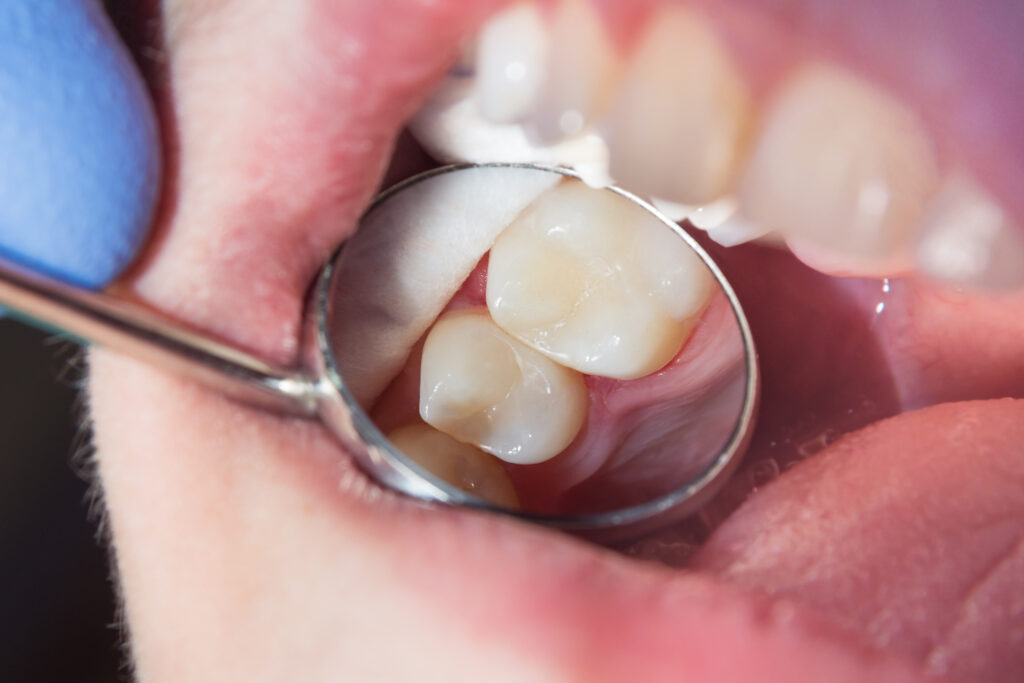Tooth decay is a common dental problem that affects the tooth structure. Dental infections begin when harmful bacteria feed on sugars and starches in the mouth. These bacteria release digestive acids that break down the tooth enamel, the outer tooth layer. The digestive acids break down the teeth and create holes or pits called cavities. At Coastal General Dentistry, we can treat your tooth cavity in Virginia Beach, VA.
Treating cavities and other signs of dental infection is a part of general dental care. General dentistry can help prevent problems from worsening over time, including tooth infections. You can lose permanent teeth if a dental infection spreads through the mouth. Professional dental treatment is essential to prevent tooth loss.

Signs of Tooth Infection
Knowing what to look for if you develop a dental infection can help you get the care you need. Aside from dental cavities, you can experience these symptoms if you have tooth decay:
- Chronic toothaches
- A bitter taste in your mouth
- Fever
- Pain when biting and chewing
- Change in tooth color (yellow or brown spots)
- Bad breath
- Tooth sensitivity to hot and cold foods and drinks
Contact our office as soon as you notice a change in the comfort or appearance of your teeth. Early, preventative care can help preserve your natural teeth and prevent the spread of infection. Treatments like routine cleanings can prevent the need for more costly or invasive procedures.
Treating a Tooth Cavity in Virginia Beach, VA
Before recommending dental treatment, we will thoroughly examine your teeth and gums. We will take digital X-rays to find signs of infection. While cavities are one of the most visual aspects of dental infections, there are other signs we cannot see with a quick exam. X-rays allow us to determine which dental treatment is best for you.
We will also consider any current medications or medications before treatment. They can impact how you react to sedation, which we can use for tooth extractions.
Root Canals and Fillings
A root canal is a common treatment for deeper dental cavities that reach the inside tooth chamber. Dental pulp, or the nerves and blood vessels that keep teeth alive lie in the tooth chamber. As decay reaches the inside of the tooth, it infects the pulp.
During root canal treatment, we remove infected dental pulp from the tooth. Then, we clean and disinfect the tooth chamber. Finally, we seal the tooth with a tooth-colored filling. We also recommend covering large fillings or weakened teeth with a dental crown. A dental crown, or cap, fully covers and protects the treated tooth.
Dental fillings can complete root canal treatment or fill smaller cavities. While fillings of the past used metal materials, we prefer composite fillings. These restorations, known as white fillings, blend in with your natural teeth.
Tooth Removal
If your tooth is too weakened or damaged for a filling, we must remove it to prevent damage to other teeth. Tooth extraction can remove a tooth that is too decayed to support your natural tooth structure.
While many patients may think removing a tooth is painful, we will numb your mouth before treatment. Additionally, depending on the type of extraction, we may recommend sedation. Once you heal after the tooth removal, we recommend a restorative treatment, like a dental implant, to restore your tooth.
Patient Review
Tooth Cavity FAQs
Do you want to know more about cavities and tooth decay? Read answers to these commonly asked questions:
What does a decayed tooth look like?
Sometimes, a decayed tooth appears different from natural teeth. This is especially true in the later stages of tooth infection. As decay affects the tooth, holes or cavities can form to expose the inside of the tooth.
Parts of the tooth can appear yellow or brown as bacteria damage the tooth enamel. Additionally, as the tooth weakens, it is more prone to injury, and parts of the tooth may break.
Can you reverse tooth decay?
Yes, you can reverse tooth decay in the early stages of infection. As long as the infection does not severely damage the tooth enamel, professional care can help stop decay. A thorough dental cleaning and a good at-home oral hygiene routine can halt the spread of infection.
Can your tooth heal a cavity by itself?
Unlike other bones of the body, teeth cannot heal themselves. You will require professional treatment to treat tooth cavities. Left untreated, cavities can destroy your tooth structure, and you will need a tooth extraction. Please do not wait for a tooth to heal a cavity itself.
How long can you leave a cavity untreated?
It can take small cavities several months to get bigger and pose a big risk to your dental health. However, we recommend visiting our dentist’s office to treat your cavity immediately. As cavities worsen, you’re at an increased risk of requiring tooth removal for a dead tooth. In addition, you can experience chronic pain if your dental infection is left untreated.
Can tooth decay create a tooth abscess?
Yes, the same harmful bacteria that create cavities can create a dental abscess. If you have a dental injury or cavity, your tooth infection can travel through your tooth and to the side or the tip of your tooth’s root. This infection is called a dental abscess, a highly painful pocket of pus that creates inflammation.
What is a dead tooth?
A dead tooth occurs when the blood vessels, cells, and nerves within the tooth die. This means the tooth no longer receives blood flow. We can save a dead tooth with a root canal. However, if the tooth is too damaged for a root canal, it must be removed.
Treat Dental Infections Today
Fill a tooth cavity in Virginia Beach, VA, to save your natural tooth. Call us for comfortable cavity treatment at 757-216-9914. You can also schedule a dental appointment at Coastal General Dentistry.
Please let us know if you have questions or concerns about tooth decay. We’re here to customize treatment to treat your dental symptoms.

